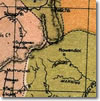George Long was born on the 5th of November, 1874 to English parents. After leaving Maryborough Grammar School, he pursued a career at the City of Melbourne Bank. Long was encouraged to matriculate by his vicar Canon Charles Harris. Canon Harris also instructed him in public speaking and persuaded Archbishop Goe to offer Long the Rupertswood theological studentship at Trinity College, a college of the University of Melbourne. Long received a Bachelor of Arts in 1899, and a Master of Arts in 1901. Long was made a deacon in 1899, and was made a priest in 1900. Long then became senior curate to Archdeacon Hindley at Holy Trinity Church, Kew. Long campaigned for the foundation of a boys school and eventually became the founding headmaster of Trinity Grammar school in 1904. Long was an excellent headmaster described as having a "mysterious gift of personality which excites the personal devotion and enthusiasm of the boys." In 1910 Long was made a canon of St Paul's Cathedral and in 1911, Long became one of the very few Australian born bishops when he was elected bishop of Bathurst, New South Wales. Long used his experience in banking to modernize and reorganize the antiquated diocesan finances and ordinances. He was awarded a Lambeth Doctorate of Divinity in 1912.
In 1917, Long enlisted in the Australian Imperial Force (A.I.F) as a chaplain and honorary captain. Long served with great distinction and was promoted to honorary lieutenant-colonel and later to brigadier general. Long played a huge role in easing the transition from war to peace, especially for the soldiers, and helping to rebuild the shattered infrastructure of Britain and France. Longs contribution was recognized when he was awarded two honorary Doctor of Laws, one by the University of Cambridge in 1918 and the other by the University of Manchester in 1919. He was also appointed Commander of the Order of the British Empire (C.B.E) in 1919. Later that year Long returned to his diocese and worked tirelessly to improve educational opportunities, not just for the members of his own diocese at Bathurst but also beyond the boarders of his jurisdiction. This was demonstrated by his enthusiastic campaign to have St John's Theological College at Morpeth re-established. Long worked with Sir John Peden in an effort to establish a constitution for the Church of England in Australia independent of the Church of England. In 1928, his draft was accepted by every diocese except Sydney and later became the basis for all future versions. Long became bishop of the Anglican Diocese of Newcastle in 1928. His knowledge of economic and industrial difficulties made him immediately popular with the predominately mining orientated community of Newcastle. Long retained his connection with the A.I.F and in 1929 was appointed chaplain-general. In 1930, while in England to attend the Lambeth conference Long suffered a cerebral haemorrhage and died. George Long was honored in life and in death for both his contributions to the Church of England and to the Australian war effort. He was described as "one of the great Australians of his generation" and who played a crucial role in the "turning of the A.I.F's effort from destruction to construction."
|

